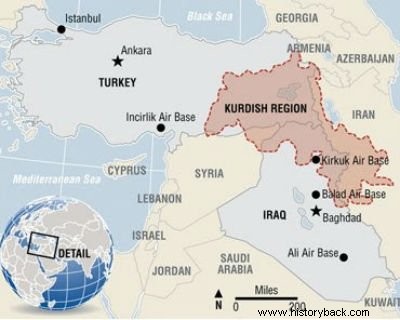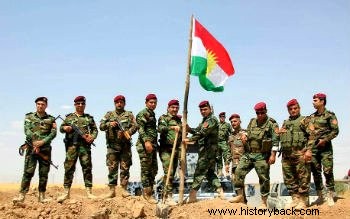The Kurds are an ethnic group originally from the Middle East and it is estimated that there are about 30 million Kurds spread across the world.
This people was part of the Turkish-Ottoman Empire and did not receive a territory to constitute an independent country after the First World War.
Today, in addition to fighting for an autonomous territory, they are on the front lines of the war against the Islamic State.

Map showing the hypothetical country Kurdistan.
Origin and Characteristics of the Kurds
Kurds are the 4th ethnicity in the Middle East after Arabs, Persians and Turks. They were already mentioned since antiquity by the Greek historian Xenephon, later described by the traveler Marco Polo in the th century. 13 and in Arabic books of the Middle Ages. One of the great Muslim leaders during the Crusades, Saladin, belonged to the Kurdish ethnic group.
The majority of Middle Eastern Kurds live in Turkey, 14 million people; Iran, 7 million; and Iraq, with 6 million. Countries like Syria, Azerbaijan and Russia have native Kurdish communities. In Europe, Germany stands out as it has a community of 1 million Kurds, most of whom are Turkish citizens.
Another feature that distinguishes them from other peoples in the region is their language, which is derived from Iranian. Most of the time, the Kurdish language is written in the Latin alphabet and not in the Arabic alphabet.
See also:Arab culture:discover its origins and traditionsKurdish Religion
As the Kurdish ethnic group comprises 30 million people, we find Kurds who profess a wide variety of religions such as Christianity, Judaism and Islam.
However, attention is drawn to the Yazidi religion , which mixes elements of Islam, Judaism and Zoroastrianism. There are about 700,000 Yazidi Kurds , and the vast majority, 500,000 people, live in the Sinjar Mountains, a region near Mosul, Iraq.
The Yazidi believe in one God and creator, adopt baptism and circumcision. However, they worship an angel in the form of a peacock, known as Melek Tawwus (Peacock Angel). For Sunni Muslims, this angel is identified as the devil who made the Yazidis were the target of massacres for being considered evil worshipers.
Likewise, the fact that they perform their prayers facing the sun makes many think that the Yazidis be heathens. In fact, the sun would be the maximum representation of divine goodness, as it rises for everyone. The symbolism of the star-king is so strong for this religion that the sun is stamped on the Iraqi Kurdistan flag.
Kurdish Nationalism
Kurdish nationalism dates back to 1910 when they were part of the Turkish-Ottoman Empire. This year the flag of the future country was created and more space was claimed within the Empire.
With the end of the First World War, the Central Powers stipulated in the Treaty of Sèvres (1920) a future country for the Kurdish people as was done for the Persians and Iraqis.
However, due to the interests of Great Britain and Turkey itself, a new agreement, the Treaty of Lausanne (1923), buried this possibility. In this way, Kurds continued to be persecuted in the countries they lived in and treated as second-class citizens.
In Turkey, the government banned any mention of Kurds and used the euphemism “Mountain Turk” to describe them. Likewise, the use of Kurdish symbols such as the flag, language and artistic manifestations was prohibited.
In response, some Kurds in Turkey created the Kurdish Workers' Party (PKK), with a Marxist-Leninist orientation. As Turkish repression increased, they adopted guerrilla tactics and promoted rebellions.
With the end of the Cold War and international pressures, this situation has changed. One example took place in 2015, when the Kurds elected 80 deputies to Turkey's Parliament for the first time.
Read more about the Turkish-Ottoman Empire and Nationalism
Kurds in Iraq
Kurds inhabit the western region of Iraq and have been persecuted by Iraqi governments since the creation of this country. In 1970 the Region of Kurdistan or Kurdistan was created, where 7 million people live and whose capital is Erbil.
Despite their autonomy, in 1988 they were victims of a chemical weapons attack ordered by Saddam Hussein during the war between Iran and Iraq.
However, the Iraqi Kurds managed to regain autonomy from Baghdad after the dictator's death in 2006. Currently, the Iraqi army cannot enter this territory.
Due to the oil reserves, Kurdistan is experiencing a great economic moment, and this is reflected in the construction of modern buildings, airports, and other infrastructures that the new country needs.
See also:Civil WarKurds in the fight against the Islamic State

Kurdish soldiers pose with the flag of Kurdistan
Currently, the Kurdish army, called the Peshmerga, is on the front lines against the Islamic State in regions such as northern Syria and Iraq.
Poorly armed, lacking the proper equipment for a 21st century war, the Peshmerga have regained some territories from the Islamic State, but at the same time suffer casualties and lack of support from foreign powers.
In 2016, the United States entered into a cooperation agreement with the Peshmerga to help them fight the Islamic State.
The Peshmerga also accepts women in the Army and this fact is exploited in the media, as it is not unheard of in Middle Eastern societies.
However, they fight for three causes, as they fight to create the Kurdish national state, against the Islamic State and against the patriarchy so present in this society.
By invading territories inhabited by Kurds in Syria, for example, the Islamic State enslaved several Yazidi women. .
Currently, the Kurds are also fighting in the Syrian War.
See also:Refugee Crisis in Brazil and in the World